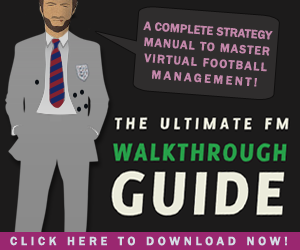-
Recent Articles
Building Your Defence: Full Backs
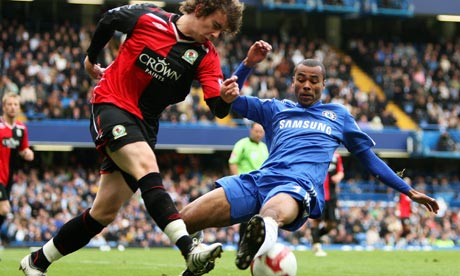 The modern full back is quickly becoming one of the most important players on the team sheet, infact even back in the days of Brian Clough, fat ed' argued that because of the space these players get in the final...
The modern full back is quickly becoming one of the most important players on the team sheet, infact even back in the days of Brian Clough, fat ed' argued that because of the space these players get in the final...False Nine Tactics
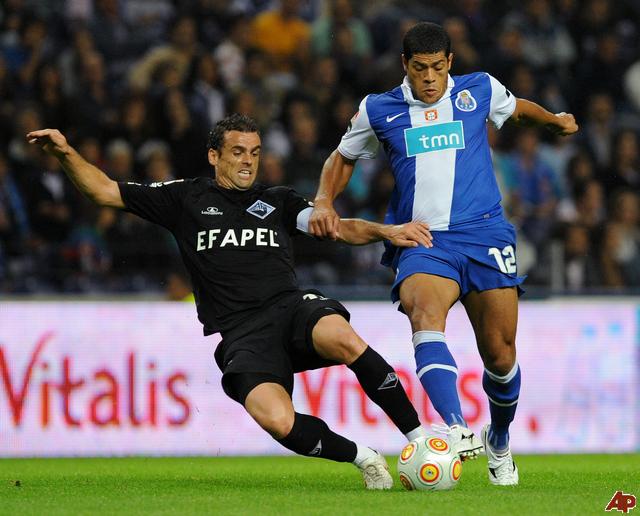 When we think about modern football trends, we think about the fall of the 4-4-2, the introduction of inverted wingers and the rise of the 4-5-1. But there is one other tactical rise that seems to have...
When we think about modern football trends, we think about the fall of the 4-4-2, the introduction of inverted wingers and the rise of the 4-5-1. But there is one other tactical rise that seems to have...An Open Letter To The Football Manager Community
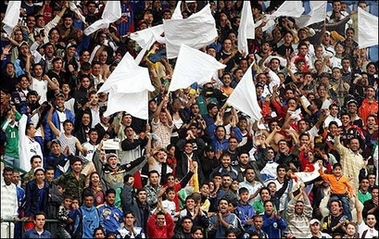 To view Sports Interactive's response, click here FM-Britain will no longer be producing regular content. Sports Interactive have objected to our content model of charging for annual strategy guides,...
To view Sports Interactive's response, click here FM-Britain will no longer be producing regular content. Sports Interactive have objected to our content model of charging for annual strategy guides,...How Will Jose Mourinho Manage at Real Madrid? (Part 7)
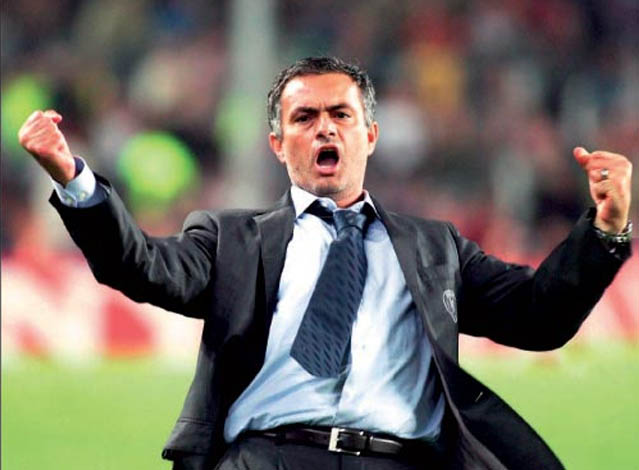 Last time around I showed you the gaping holes in my tactical plan. Against smaller teams, my players were not imposing themselves enough on the game, nor were they able to break through more disciplined...
Last time around I showed you the gaping holes in my tactical plan. Against smaller teams, my players were not imposing themselves enough on the game, nor were they able to break through more disciplined...From Giant to Underdog: Managing a Bulgarian Powerhouse (Part 3)
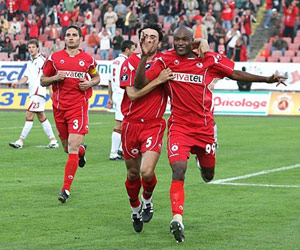 After setting the tactics for our team in the previous post, we'll look how they are going to play out in a game situation. Our first friendly will give us a chance to see how our players will handle the tactics. The...
After setting the tactics for our team in the previous post, we'll look how they are going to play out in a game situation. Our first friendly will give us a chance to see how our players will handle the tactics. The...
JOIN 8,901 READERS - SUBSCRIBE NOW TO OUR FOOTBALL MANAGER NEWSLETTER
Get the latest FM news & best community content delivered directly to your e-mail inbox!
Tactical Bible ’08: Squad Management II: Substitutions, Rotation, Team Building
Written by: Matt vom Brocke
Category: Management
Posted on: July 23, 2007
July 23, 2007
Squad Management II
Substitutions, Rotation, Team Building
Substitiontions
Player condition versus substitutions (when and who?)
This seems to be a sensitive area in the game, and it is more important then in previous versions of FM. Just like in the real game, if you feel too sure about a game while playing against quality opposition, it can lead to disastrous results and instantly change an already won game if you feel over-confident and take off one or even two key players.
For the really important big games it might be necessary to keep your key players on the pitch even if they are exhausted more then usual. Some players do set a certain limit for fitness before they make substitutions (e.g. 80%), but you should think twice if this is worth the risk in a key game. It may be better to keep them on the pitch and maybe make a very late, time-wasting substitution and give them a rest in training for one or two days or the next dead wood match.
On the other hand, even the best key player may not help you much if his fitness is below 70% late in the game. If you are concerned this might happen, it will always be helpful to keep a player in reserve. In some replays you can see that the team with better fitness will gain more and more advantage late in the game.
Physical fitness can have a major influence on performance. Players below 80% hardly can perform at any acceptable level. Sometimes you may observe this when taking over a club with a lousy arrangement of very early pre-season games. Albeit playing teams that play tiers below your own team, you will suddenly have a hard time breaking them down.
There are different strategies: only sub under-performing players if the game does not go in your favour, (the best moment seems to be in half-time since you have the opportunity to combine this with a tactical switch and a team talk). On the other hand, if you are performing well and have gained a comfortable lead against a minor opponent, this is the perfect opportunity to rest your key players, who are often threatened by exhaustion, especially in English leagues. Also it might be a great opportunity for your backups or youngsters to gain a little first team practice.
If you are playing tactics with high closing down, naturally forwards, attacking midfielders and wingers will be the first candidates for being subbed. This also seems to be helpful since most of them are more injury prone then defenders and/or will get tackled harder by the opposition.
A note on friendlies: you should not start players with less then 80 to 90% fitness and sub your key players after 45 minutes in most cases, if you want to have a squad not plagued by injury problems at start of the season.
Minor injuries: this is a real problem. Often key players are concerned, and you may pay a high price for keeping them on the pitch. On the other hand, very often especially those slightly injured players seem to decide the game if kept on the pitch with a crucial pass, assist or goal. There is a little helpful hint: look at the fitness level. If it is much lower then 80%, this could be a sign for a more serious injury, and it will not make much sense to keep them playing with e.g. 60%. A good compromise can be to keep them on the pitch until half time or to sub them 10 to 20 minutes later if he was injured in second half.
Bench strategy
Of course it will be helpful to plan ahead and have a bench with players you can throw in if needed. If you are playing with e.g. three attacking midfielder but don’t have any on the bench, it will be hard to make a tactical change that can turn around your game later. This can be a good way to rest key players and keep them in reserve if needed, e.g. in cup games or against minor opposition.
Many players prefer to use the maximum of possible substitutions in every game to increase the squad depth and keep the backup and utility players happy.
A useful rule of thumb:
Winning easily: Sub all three players before the hour.
Close game: Keep players on unless their fitness will drop below 80%.
Generally never sub after 70 minutes as the sub will struggle to get above a 6.
Make an exception to this rule, if you are playing a close game and you scored a late 3-1. If you want to rest one of your key players, it makes sense to take them off that late at cost of a match rating for the substitute.
If you prefer a more careful bench strategy, you should keep one player on the bench until 80th-85th minute.
Squad Rotation
Increasing the squad depth, reducing the injury risk and gaining economical success
Rotation is a must for any team that plays more then one game per week on a regular basis. Even if you only play once a week it will have benefits as soon as one of your regular first team members will see a drop in form or suffer from an injury.
If you really have players you never want to see on the pitch, you should seriously ask yourself why you still have them in your team since they will most likely cost you a lot of money and sooner or later disrupt the harmony. Your chance to get rid of them without paying for a mutual termination will be close to zero if they never get the chance to prove themselves either and attract other clubs with half decent performances.
Another big advantage of squad rotation is the increase of squad depth. You will know how good your second or third choice is if you really need them because of injuries, bans and other unfortunate events like international call-ups. And they will not have to jump in without any match practice either.
As mentioned before, there in an economic factor as well: successful teams will be able to raise the value of their utility players as well and may gain fantastic prices on the transfer market. Even for the best clubs (maybe not if you have a sugar daddy) this can lead to a dramatic increase of financial power on the transfer market.
Both in this game and the real game, it is often the strength of the utility players that will decide about the success over the course of a season. Whatever you can do to strengthen this area (with or without spending additional money) will certainly pay off in the long run.
There seems to be something like competition in the game, and overall a squad which is rotated at times, seems to deliver better and more constant performances.
A very helpful feature to keep squad depth, match practice and to fight dips in form are reserve teams and second teams who play competitive matches, e.g. in Germany and Spain. You can assign players for a period of time or until match fit to these teams. A good match in the second team often works wonders for a player’s morale and next first team performance.
Team gelling and new signings
Patience is a virtue
Everyone who played a team with many loan players, or a newly promoted side with many new faces plus loan signings like e.g. Zaragoza, will notice that team gelling can be an important factor in the game.
Sometimes you cannot avoid to sign large numbers of new players, especially if you want to compete at a higher level, or if you do not want to miss the opportunity to get a number of great Bosman-signings. But you should accept the fact that the new team will need time, and most new signings will need time as well, especially if they are from abroad and don’t speak the language.
Most obvious problems can occur with new keepers who do not speak the domestic language yet. There seem to be very few convincing debuts of these players, if you are hasty and want to throw them in instantly without giving them any time to adapt. There have been reports about Akinfeev becoming worst signing of the season, and this may be one of the reasons for this stunning result.
Other problems can occur when signing players on loan, especially if they are unhappy with their situation at the home club. These problems will often be carried into your team, and the player will have lower morale. If this is combined with low adaptability and missing language skills, the player may well perform far below his limits. This is especially unfortunate since you cannot communicate with these players via media interaction, except for praising him endlessly as great player, which seems to have little impact. Your only way to support them is via good performances and encouraging team talks.
In all of these cases, squad rotation and adaptation via reserve/second team matches can work wonders and give the new players time to grow into your team. If you have spent millions for fees and wages, this can decide about your future at the club.
Tactical Bible Credits
JP, Millie, Crazy Gra. Written by The next Diaby. Editor: Millie
About The Author: Matt vom Brocke
Matt’s contribution to FM-B as a whole and the tactical area in particular cannot be over-estimated. The writer of the very well-recieved Communication and Psychological Warfare and Creativo set of tactics, Matt is a key member of the Tactical Think Tank and part of SI’s beta testing Dream Team.
Download Our Tactical Theorems '10 eBook Absolutely Free

Presenting the most comprehensive tactic design and match strategy guide to the Football Manager series ever created!
Written by FM match engine beta testers, it's 60+ pages of easy-to-read concepts and ideologies for getting your team playing exactly how you want each match! It's been downloaded over 100,000+ times to date!
Find out more information about our tactical eBook
and download Tactical Theorems '10 right now!
Written by FM match engine beta testers, it's 60+ pages of easy-to-read concepts and ideologies for getting your team playing exactly how you want each match! It's been downloaded over 100,000+ times to date!
and download Tactical Theorems '10 right now!
Web discoveries
- UK Casinos Not On Gamstop
- Online Casinos UK
- Best Slot Sites
- Non Gamstop Casinos
- Casino Sites Not On Gamstop
- UK Online Casinos Not On Gamstop
- Slots Not On Gamstop
- Non Gamstop Casino UK
- Non Gamstop Casino UK
- Casino Sites Not On Gamstop
- UK Online Casinos Not On Gamstop
- Casinos Not On Gamstop
- Gambling Sites Not On Gamstop
- Non Gamstop Casinos
- Non Gamstop Casinos
- Non Gamstop Casino UK
- UK Casino Not On Gamstop
- Casino Sites Not On Gamstop
- UK Online Casinos Not On Gamstop
- UK Online Casinos Not On Gamstop
- Brand New Casinos Not Blocked By Gamstop


